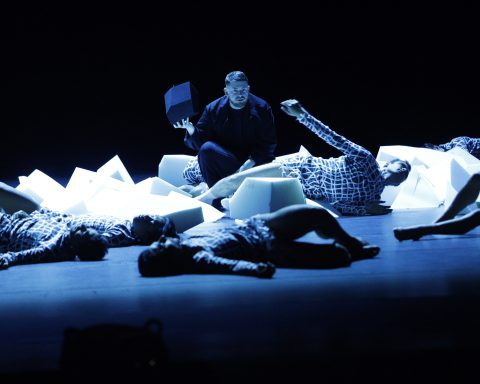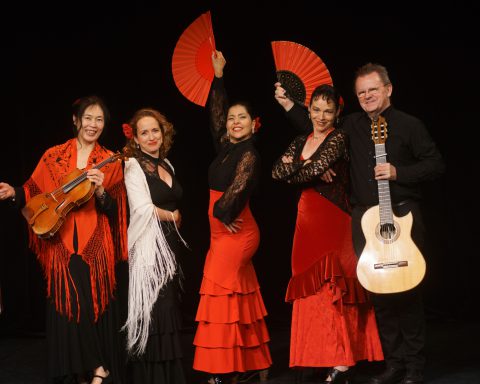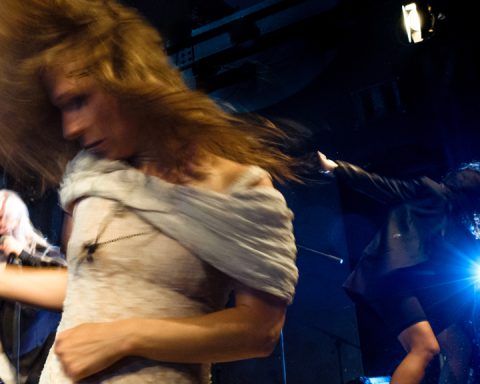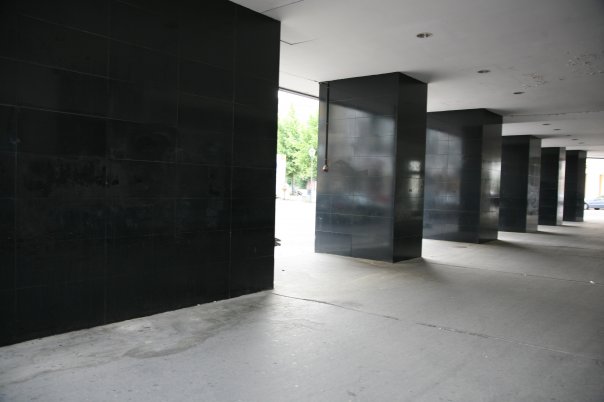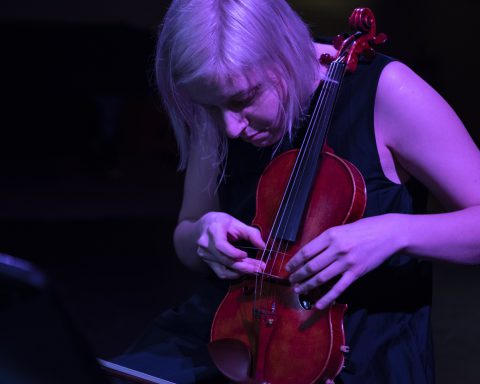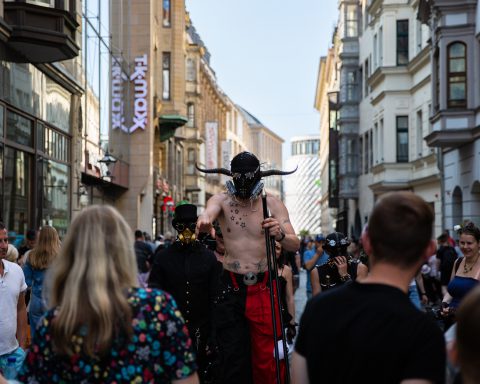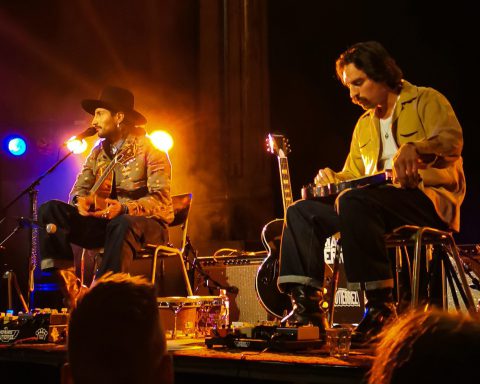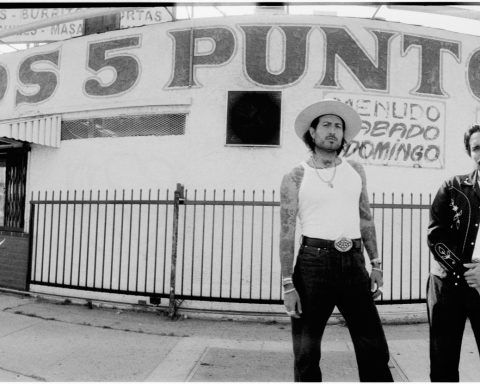When a platinum-selling musician releases an album and announces a European tour, it is usually remarked that such a person might require no introduction. As a music producer, the name Gordon Raphael is up there on the small print credits of some of this century’s biggest records.

His critically-acclaimed work with The Strokes particularly influenced and impacted indie culture with such sucker-punch magnitude that Is This It is as consensually definitive to its chapter in alt-rock history as Nirvana’s Nevermind was to the chapter immediately before.
Yet, despite a career recording and producing this and other household-name acts like Regina Spektor and Skin from Skunk Anansie, Sleep On the Radio is Gordon Raphael’s first full-length album, the first one with his songs and his name on the front cover. It has been out in the public domain for 6 weeks now.
It’s a debut from a veteran who has been making records for 30 years, but always other people’s records, and always from behind the mixing desk.
This makes Raphael a rare paradox, one for whom any introduction feels genuinely irrelevant in the context of what to expect from a Gordon Raphael record. Those, like myself, who associate his name with early Strokes, would not predict songwriting as hard and adventurous as what is evident here on Sleep on the Radio.
This is an art-rock record. It does whatever the fuck it wants, sometimes. So, one might then presume a link between this album and his work with Regina Spektor on her weird and strident breakout record, Soviet Kitsch – but it doesn’t sound like that either. It has classic rock roots.
—
“Sleep on the Radio” sounds to me like a 90s take on early-70s rock and roll. Bowie and Lou Reed reverse influenced by new wave. How would you describe the music on this album?
Gordon: I’d describe these songs as a ‘Greatest Hits’ collection that span my entire career. They capture the beginning, and the middle, and the right now of my musical experience. They’re songs that I wrote and collected over many years, that I liked a lot and wanted to record. I just picked the best ones.
What prompted you to make this record now?
Gordon: I was in Buenos Aires, which is a fantastic musical town, and unlike other places like Seattle, or London, or Berlin, the people there actually know who I am! Like I’ll be walking down the street there and people will be coming up to me with CDs to sign…
…which is really, really cool.
Anyway, there were musicians there that had heard these songs that I’d written. They’d found them on the internet somewhere, and they approached me and said that they wanted to be in a band with me. So I ended up having two bands – one in Europe and one in South America – and we were having fun together playing these songs. That’s how this project got started.
—
Gordon Raphael was born and raised in pre-grunge Seattle. The “beginning” he is making reference to is the rock music that he grew up with in his formative years. His lyrics carry the candour and humour of Lou Reed in 1972. The singing style is in the key of Bowie in 1973. The spirit of Jimi Hendrix is on guitar, and the track “Superstrong” feels like all of these artists jamming out a version of the Rolling Stones’ “Gimme Shelter” with the brightness turned all up.
These are the roots of Raphael’s style. They are unremarkable roots in themselves, but what makes this music interesting is hearing those pre-punk influences clash violently with the modern post-punk new waves of the middle and the right now. The best track, “Savage,” with that irresistible synth riff, sounds like Gary Numan backing Bowie, Hendrix, and a Sega arcade machine.
There is the sequencing of deadpan grunge rock – “It’s So Sleepy in this Noisy Chair” – immediately before the dream-sequence-playful pop of “I Sleep On the Radio.” There is a funk interlude in “SWDWSWT”. “Ring of Gold” is a sludge of modulation.
There are weaker and stronger tracks, but every song on Sleep on the Radio at least tries to find new contexts with which to play with the affectations of those aforementioned early influences. That might explain why the whole album feels neither of its time, nor of any time, really – but fans of Pink Floyd’s Wish You Were Here-era will find a lot to enjoy on here.
For clarity’s sake, I scored “Sleep on the Radio” strongly: 7.84 out of 10.
—
Last night was the first night of the European tour. How did it go?
Gordon: It was exciting. It was a small crowd [in Belgrade], but everyone had a lot of energy, and it was a lot of fun.
[Gordon Raphael’s last full-length musical release as a band member was playing keyboards on Sky Cries Mary’s 1998 release “Fresh Fruits for the Liberation”]
Is this he first time that you’ve been on tour in 30 years?
Gordon: About three years ago, we [Gordon Raphael & The Half Full Flashes] had a tour of the UK, but that tour was very unsuccessful. We played several dates across the country, and it was very badly organised and poorly promoted, and poorly attended. The London show was okay, but the rest of the tour was not good. Prior to that I was last on tour playing keyboards and guitars with the Psychedelic Furs in 2001.
—
Gordon’s band, The Half-Full Flashes, are: Kevin Kuhn from Die Nerven on drums; SKY + Air duo, Eleni Zafiriadou and Daniel Benjamin, on guitar and bass respectively; and Christian Heerdt – aka Käse. Der Ritter – on keys. Gordon Raphael is, of course, on lead guitar and vocals.

The band are currently touring Sleep On the Radio across the length and breadth of Germany, Austria, the Czech Republic, Serbia, and Luxembourg. They play Ilses Erika in Leipzig on Thursday 10 May, from around 10 pm, with support from Yor.
Gordon Raphael is no stranger to Germany. His band are German, and – like so many of us – he has made his home here. He’s been living in Berlin since 2005.
—
Was moving to Berlin a conscious decision?
Gordon: In 2005, I was working on [The Strokes’s third album,] First Impressions of Earth. I was living in a tiny apartment that was actually owned by Donald Trump, and the rent cost around $3000 per month.
I wasn’t paying for it, of course. The band and the record company were paying for it.
Anyway, I had a bed and only the minimum amount of living space. I had my keyboard and my guitars all around the bed, and at the time a friend of mine [Moses Schneider] was living in Berlin, and he said he was paying $800 a month for seven rooms – seven rooms! – and I was thinking: what could I do with seven rooms? I could have a disco. I could do whatever I wanted with seven rooms. So I moved here for the space.
Rents have gone up in Berlin now, though. What is it about Germany that keeps you here?
Gordon: That’s true, rents have gone up for sure – I now live in a 1 bedroom apartment in Mitte – but I like the vibe here. It’s much more relaxed. I like being able to cycle everywhere, and Berlin doesn’t have the same failings that a lot of the US cities, and some of the UK cities, have at the moment.
The one problem that I thought I’d have here is that there aren’t so many rock bands. In Berlin, it’s all techno music, and electronic music, and the bands that are here don’t have big budgets to spend on recording [with a producer like me].
Around the time that I started to worry about this, my phone started to ring and people started calling and saying, “I’ll pay for you to come to London,” or “I’ll pay for you to come to Paris.”
Berlin is so central. It’s very easy for me to get around from here.
—
In April, Hinds released I Don’t Run. I was twelve years old when The Strokes came out, and sometimes it feels like there’s Is This It DNA code in every new indie record I’ve ever heard, but I Don’t Run went the whole nine yards. The guitars were turned up, the rhythm section was turned down, the vocals casual and melodic and distorted for exactly eleven 3-minute pop songs.
Of course, the producer on I Don’t Run was Gordon Raphael – and listening to that Hinds record, I can only picture four Spanish girls intercomming to the captain in his noisy chair from four sound-proofed booths – can we make our record sound just like that one? – and I expect this is common. For bands who want to replicate that Strokes sound, it makes sense to go straight to the man who produced that sound.
However, just as Is This It was a radical left-turn from grunge and Britpop and really sad boys from Sebadoh, an album like Sleep On the Radio is truer to that vein of creative spirit than any of the copycats. Even if musically the two are worlds apart, they both share the motives of originality and ambition and shameless oddity.
The fact that it exists and has been published under Gordon Raphael’s real name has also low-key redefined, for those who will forever view his work through the lens of the early millennium, what a Gordon Raphael record actually sounds like.
Thus, no further introduction is necessary.
LIVE: GORDON RAPHAEL & THE HALF FULL FLASHES
Thursday, 10 May
Tanzcafé Ilses Erika
Bernhard-Göring-Str. 152
04277 Leipzig
Doors open at 22:00 / begins at 23:00
Supporting act: YOR
Aftershow DJ: Timm Völker (206)
Cover shot: Gordon Raphael. © Ruby James

